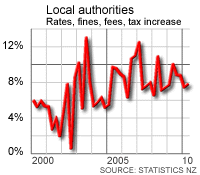 Rates charged by local councils in New Zealand rose 8.4% in the March quarter from the same period a year ago, figures released by Statistics New Zealand (Stats NZ) show. This is almost three times the 3% increase in the consumer price index over the same period. Council income from regulatory expenses and taxes fell by 4.9% in the same period, due to the decline in building consents over the last year. Local authorities had a combined operating surplus of NZ$78.5 million in the quarter, down from NZ$90.8 million in the first quarter of 2008. It was well down from the average of NZ$118.5 million for the March quarters of 2003, 2004 and 2005, but slightly above surpluses in 2006 and 2007. Seasonal adjustment showed councils' operating surplus fell 16.1% from December to NZ$42.8 million. The amount of rates charged rose to NZ$980.5 million in the March quarter from NZ$904.6 million a year before. The 8.4% annual rate of growth was up from 5.9% annual growth in the March quarter of 2008. It also compared to 8.1% in the December quarter of 2008, 9.1% in September and 9% in June. Regulatory income (which includes income from building consents) and petrol tax revenue fell 4.9% to NZ$94.1 million in March from a year ago. This followed an annual decline of 1.6% in December, and was down from 7.3% annual growth in the March 2008 quarter.
Rates charged by local councils in New Zealand rose 8.4% in the March quarter from the same period a year ago, figures released by Statistics New Zealand (Stats NZ) show. This is almost three times the 3% increase in the consumer price index over the same period. Council income from regulatory expenses and taxes fell by 4.9% in the same period, due to the decline in building consents over the last year. Local authorities had a combined operating surplus of NZ$78.5 million in the quarter, down from NZ$90.8 million in the first quarter of 2008. It was well down from the average of NZ$118.5 million for the March quarters of 2003, 2004 and 2005, but slightly above surpluses in 2006 and 2007. Seasonal adjustment showed councils' operating surplus fell 16.1% from December to NZ$42.8 million. The amount of rates charged rose to NZ$980.5 million in the March quarter from NZ$904.6 million a year before. The 8.4% annual rate of growth was up from 5.9% annual growth in the March quarter of 2008. It also compared to 8.1% in the December quarter of 2008, 9.1% in September and 9% in June. Regulatory income (which includes income from building consents) and petrol tax revenue fell 4.9% to NZ$94.1 million in March from a year ago. This followed an annual decline of 1.6% in December, and was down from 7.3% annual growth in the March 2008 quarter.
The amount of grants, subsidies and levies given to local councils from central government rose 19.2% from a year ago to NZ$253.3 million. This was down from annual growth of 28.8% in December and 25.7% in September, but still up from 10.9% in March 2008. Councils' investment income fell 1.3% from a year ago. This compared to an average annual fall of 11.9% in the December, September and June quarters and 6.9% growth in March 2008. The annual growth in employee costs fell to 6.8% in the March quarter, its slowest rate of growth since the June quarter in 2006.

We welcome your comments below. If you are not already registered, please register to comment
Remember we welcome robust, respectful and insightful debate. We don't welcome abusive or defamatory comments and will de-register those repeatedly making such comments. Our current comment policy is here.